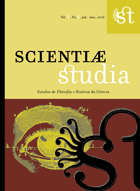Origem da vida e origem das espécies no século XVIII: as concepções de Maupertuis
DOI:
https://doi.org/10.1590/S1678-31662003000100004Palavras-chave:
Geração, Origem da vida, Origem das espécies, Epigênese, Preformação, Transformismo, Evolução, Mecanicismo, MaupertuisResumo
A obra de Pierre-Louis Moreau de Maupertuis abrange os domínios da geometria, da física e da astronomia, mas também explora um tema biológico central da agenda científica e filosófica do século XVIII: o problema da geração dos organismos. No Sistema da natureza (1752), o autor apresenta uma ampla teoria que pretende explicar, a partir de um princípio gerativo universal, como os organismos atuais são gerados, como as espécies podem conservar-se ao longo do tempo e como ocorre a formação de novas espécies a partir de uma dada linhagem de organismos. Com base em tais explicações, Maupertuis apresenta certas conjecturas sobre a origem dos primeiros organismos e das primeiras espécies que serão o objeto central deste artigo. Segundo nossa interpretação, Maupertuis explorou o problema das origens da vida e das espécies a partir de dois quadros teóricos distintos, que designaremos como quadros metafísico e físico das origens. No primeiro, a ação de Deus é decisiva para a produção dos primeiros organismos e das primeiras espécies, mas no segundo essa mesma produção é explicada conjecturalmente a partir de uma concepção natural e atomista.Downloads
Referências
EHRARD, J. L’idée de nature en France dans la primière moitié du XVIIIe siècle. Paris, Albin Michel, 1994.
MAUPERTUIS, P.-L. M. de. Essai de cosmologie. S/loc., s/ed., 1751.
MAUPERTUIS, P.-L. M. Oeuvres. Vol. II. Hildesheim, Georg Olms, 1965a.
MAUPERTUIS, P.-L. M. Oeuvres. Vol. IV. Hildesheim, Georg Olms, 1965b.
MAUPERTUIS, P.-L. M. El orden verosímil del cosmos. Madri, Alianza, 1985.
PYLE, A. J. “Animal generation and the mechanical philosophy: some light on the role of biology in the scientific revolution”. In: History and Philosophy of Life Sciences 9, 2, 1987, p. 225-54.
ROGER, J. Les sciences de la vie dans la pensée du XVIIIe siècle: la génération des animaux de Descartes à l’Encyclopédie. Paris, Armand Colin, 1993.
Downloads
Publicado
Edição
Seção
Licença
Copyright (c) 2003 Scientiae Studia

Este trabalho está licenciado sob uma licença Creative Commons Attribution-NonCommercial-ShareAlike 4.0 International License.
A revista detém os direitos autorais de todos os textos nela publicados. Os autores estão autorizados a republicar seus textos mediante menção da publicação anterior na revista. A revista adota a Licença Creative Commons Attribution-NonCommercial-ShareAlike 4.


